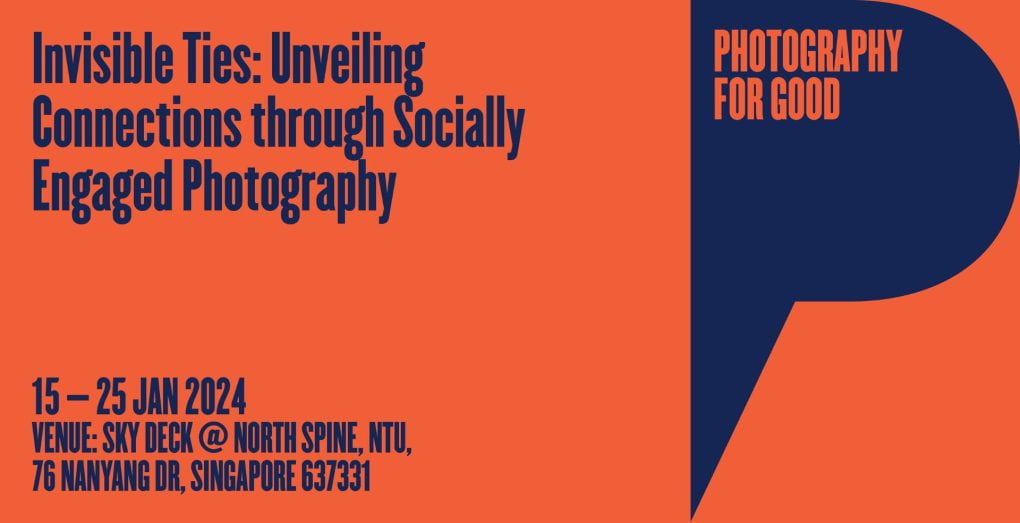
EXHIBITION FOR PHOTOGRAPHY FOR GOOD 2024
Invisible Ties: Unveiling Connections through Socially Engaged Photography
This exhibition features 13 student projects which delve into the intersection of art and social engagement through the camera’s lens. Each project serves as a visual dialogue, sparking conversations about diverse social issues and the intricate web of relationships that bind communities together. Social interaction and participatory aspects of the practice are essential in social forms of art. Socially engaged photography offers the opportunity to examine systemic issues in society and inspire social and artistic action towards a more equitable future. In this field, we recognise that an artist’s value resides not solely in the outcomes of what they produce but in new knowledge and methods learned in the process of making.
The projects span a myriad of compelling topics, including, youth mental health, caregiving for persons with dementia, education, complexities in fertility, food waste, environmental conservation, solidarity for health care workers, sports communities and making space for listening, remembering and connecting. Each photographer invites viewers to reflect on photography’s potential and limitations in fostering empathy, understanding and social action. We invite you to explore the constellation of rich and complex relationships navigated by the photographers, shedding light on our collective experience of being human.
FREE PROGRAMMES FOR PHOTOGRAPHY FOR GOOD 2024
Workshop 1: Ways of Not Seeing
Date:19 Jan, Friday, 12pm – 2pm
Venue: LHN-TR+02 @ ARC
Click Here to sign up for this workshop.
Drawing on the artist’s research on aphantasia (a blindness of the mind’s eye) this workshop is motivated by a curious desire to unpack clichéd notions of “wellness”, envisioning it beyond what we can most immediately sense. For example, is it realistic to expect “recovery” as a journey with clear beginning, middle, and end? In this workshop, participants are invited to explore, both individually and collectively, the ways in which process marks our lives. How can we come to terms with our unfinished stories and savour wellness as process and not outcome?
For the workshop, please bring a physical object that represents something “unfinished” or “still-in-the-process-of”. This can be an object, artefact, heirloom, printed photo, drawing, poster, ticket stub, receipt, luggage tag, and so on.
*The object you bring will be held by other participants during the workshop, so do bring something that you are comfortable for others to touch and handle.
** “Ways of Not Seeing: Aphantasia and its Affiliations” is the artist’s overarching research for the Calm Room Creative Residency at National Gallery Singapore. This workshop is part of a continuing collaboration with Janel Ang and Wong Hui Yu.
Presenter: Jevon Chandra
Jevon Chandra (b. 1991) is a transdisciplinary artist and researcher. Through time and context-bound installations and interventions, his works estimate the push and pull between notions of doubt and belief, as present in acts of love, hope, and faith. He is presently the inaugural artist-in-residence at National Gallery Singapore’s Calm Room program and co-lead of Brack, a Singapore-based socially-engaged arts collective.
As lead/co-lead artist, his projects have been presented at platforms such as National Gallery Singapore’s Gallery Children Biennale 2023, Singapore International Film Festival (SGIFF) (2022), Leipzig International Art Programme (Germany, 2022), Singapore International Festival of Arts (SIFA) (2021), Singapore Art Week (2021), Fujinoyama Biennale (Japan, 2020), Incheon Art Platform (South Korea, 2019), Esplanade Flipside Festival (2019), Understanding Risk Conference 2019 (Chiang Mai), The Substation (2018), and OXO Tower Wharf (London, 2017).
As a collaborator in the performing and media arts, recent credits include multimedia and sound design for Between 5 Cows and the Deep Blue Sea… (2022) for Esplanade’s Kalaa Utsavam Festival, multimedia design for Kepaten Obor – Igniting a Weathered Torch (2022) for Esplanade’s Pesta Raya Festival, _ Can Change (2021) with The Necessary Stage, and (un)becoming (2021) at T:>Works’ N.O.W. Festival. Other sound design credits include An Impression (2021) with T.H.E. Dance Company, NO FLASH (2021), an audio-fiction podcast for National Gallery Singapore.
Workshop 2: Design Approaches and Practices for Community Care Models
Date: 23 Jan, Tuesday, 12pm – 2pm
Venue: LHS-TR+24 @ Hive
Click Here to sign up for this workshop.
As the emphasis shifts towards preventative medicine and social prescriptions for our ageing society, community-based care ecosystems become critical to alleviating the reliance on tertiary care services for ageing-in-place. How can we observe and converse with elders in the community spaces to understand their needs for a good life where support comes from the weak ties that we form among neighbours? As a care advocate who designs to nudge social policies through anthropological approaches and strategic design methods, Wendy will share her team’s work for clients in the social care sector, such as the Lien Foundation, Rainbow Center, Drama Box, and Arts Wok Collaborative.
Presenter: Wendy Chua
Based in Singapore and Berlin, Wendy Chua is an interdisciplinary design researcher, curator and educator. Her practice Forest & Whale, co-founded with Gustavo Maggio, envisages design as an agent of change to create an impact in social and environmental care. They design products, services and museum experiences that redefine the way we live, from homeware objects and furniture systems to new models of care in ageing societies. With accolades like the prestigious P*DA award and the 2023 EU S+T+ARTS residency, their work has been exhibited in the Milan Triennale Museum and the Museum of Craft and Design of San Francisco, among others.
Wendy is currently hanging out with elders in local coffeeshops, as part of Hack Kopitiam, to hack community spaces through community asset mapping, advocating practices of care. As a design anthropologist, swimming between the fields of marine science, environmental humanities and design, Wendy is also designing the conditions for interdisciplinary, art-science climate inquiry through Sensing Blooms Lab to make sense of coastal threats and harmful algal blooms.
